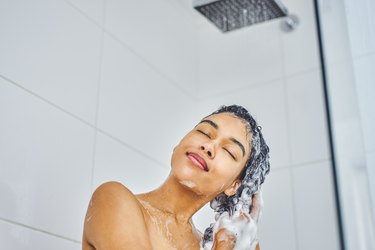
If you're lamenting your hair falling out in the shower, know this: Hair loss is a fact of life, and spying a bunch of strands in the drain is a normal part of your mane's growth cycle. The process of wetting and lathering simply serves to remove strands that are already loose.
But what's normal when it comes to hair loss after washing, and what's cause for concern? Here's what to know.
Video of the Day
Video of the Day
Normal Hair Loss in the Shower
Believe it or not, normal hair loss is shedding 50 to 100 strands per day, as part of the natural renewal process, according to the American Academy of Dermatology.
Here's a little science lesson: On a normal scalp about 90 to 95 percent of hair follicles are in the anagen, or active hair growth phase, which lasts for years — and unless they're damaged, these strands won't shed or fall out. The remaining 5 to 10 percent are in the telogen stage, and it's at this point that those 100 or so strands drop away, often when you're washing or brushing your hair.
But there are other reasons hair falls out in the shower, per the Mayo Clinic, including:
- Fluctuating hormones: Had a baby recently? Pregnancy and childbirth, along with menopause and thyroid conditions, affect your hormones — and cause hair loss. "Female pattern hair loss, which occurs after menopause, can cause thinning in the central part of the scalp," explains Mary Stevenson, MD, a dermatologist at NYU Langone Medical Center.
- Your brush and wash schedule: If you tie up your hair and forego washing it for a few days, extra loose strands are left on your head. The result? Excessive hair loss after washing on that third or fourth (or fifth or sixth...) day.
- Medications: Recovery from illness as well as some drugs used to treat depression, arthritis, high blood pressure and heart ailments may lead to hair loss in the shower.
- Stressful events: Divorce, a death or sickness in the family, a significant weight drop and job loss are just a few external stressors that can wreak havoc with the hair on your head.
- Family history: Excessive hair loss is a part of aging, though your hair type and amount may also play a role (you may have more hair to lose if it's thick and long).
- Certain styles and treatments: Too many perms, heat styling, coloring, chemical straighteners or tight braids may lead to dry hair and shedding.
- Nutritional deficiencies: A poor diet, particularly one low in iron or protein, can lead to excessive hair loss and is considered a risk factor for the condition.
When to Talk to a Doctor
A shower drain with lots of hair in it after you've skipped shampooing for several days is indeed normal. But anything more, such as big clumps falling out or overall hair thinning warrants a call to the doctor. A few common signs of overall hair thinning include:
- Widening of your normal hair part
- Increased scalp show
- Receding hair line
- Thinner ponytail
If you haven't experienced extreme stress of late and you're relatively healthy, it's still a good idea to talk with your health care provider about excessive hair loss after washing. Your physician may be able to pinpoint an underlying condition that's causing so much hair shedding and address your concerns, Dr. Stevenson says.
How to Stop Excessive Hair Shedding in the Shower
The key to avoiding excessive hair loss after washing is to be very gentle with your strands (think: air-drying and finger-combing). Check out these smart tips for tender loving lock care:
- Always moisturize: Pick a gentle shampoo and be sure to use conditioner every time you wash your hair (the leave-in kind is even better).
- Nix the heat: They're addicting, we know, but hot rollers and flat irons heat up the hair and can lead to breakage. As for blow dryers, use them sparingly and on the lowest setting.
- Go natural: Wean yourself from perms, highlights, straightening treatments and other chemical blasts to you hair shaft and wear your natural 'do (you locks will thank you!).
- Comb gently: A wide-toothed comb is your friend here — pull it slowly through your wet hair when detangling after a shampoo. Start combing at the ends of your hair and work up toward the roots.
- Style with care: Tight ponytails, buns and braids can pull on your hair, causing it to fall out.
- Eat right: Yup, your diet can affect your hair health, especially if you're low on iron or protein, or potentially vitamin D. For optimal hair health, Dr. Stevenson recommends "a well-balanced diet rich in vegetables and fruits so you end up with lots of antioxidants."
- Journal of Clinical and Diagnostic Research: Telogen Effluvium: A Review
- American Academy of Dermatology: Do You Have Hair Loss or Shedding?
- Mayo Clinic: Hair Loss
- American Academy of Dermatology: Hair Loss Types: Alopecia Areata Overview
- American Academy of Dermatology: Hair Loss - Tips for Managing
Is this an emergency? If you are experiencing serious medical symptoms, please see the National Library of Medicine’s list of signs you need emergency medical attention or call 911.